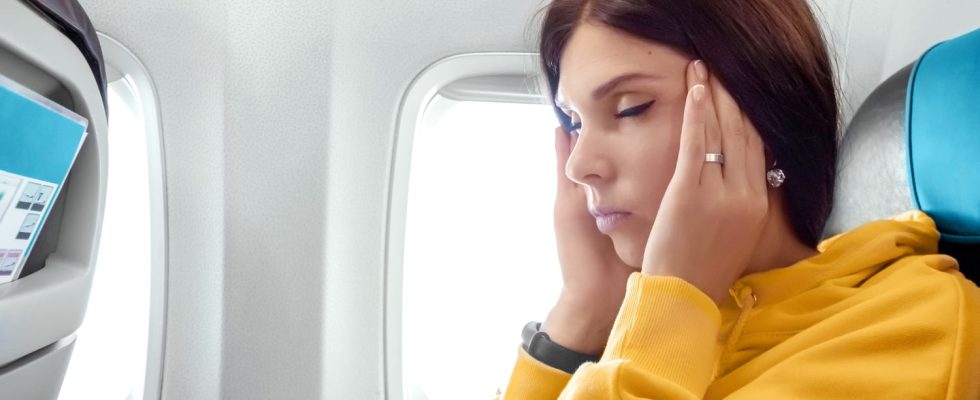Fear of flying or aviophobia is a common phobia that affects 1 in 5 people. It can range from mild anxiety to total panic. What does it mean? How to overcome it easily?
Takeoff, landing, turbulence, “air pockets”, altitude… The fear of the plane would concern approximately 20% of travelers according to’International Air Transport Association (IATA) and for 4%, a plane flight is unbearable. This fear, which stems from a phobia, is therefore frequent and more or less disproportionatewhich can be very disabling in personal or even professional life. Where is she from ? What are signs of fear of flying ? What solutions to overcome it? Hypnosis? Therapy ? A flight simulator course?
What is the name of the fear of flying?
The fear of flying is calledaviophobia, a term constructed from the words “plane” and “phobos” (φόβος) which means “fear” in Greek. We also hear the term aerophobia. “In everyday language, we speak of “fear of flying”, but this fear is more of a phobia. Phobia is a cut above fear. It’s a fear sickly and irrational about a situation. The person who is phobic will set up avoidance strategies so as not to be confronted with the object of his phobia“, describes Maïté Tranzer, clinical psychologist.
What are the symptoms of a fear of flying?
Like all phobias, phobia of flying is associated with physiological symptoms that can occur before or during the event, such as:
- Of the difficulty breathing
- A increased heart rate or palpitations…
- Nausea and vomiting
- Of the panic attacks
- Limb tremors
- Excessive sweating…
6 tips to overcome your fear of flying: internship, hypnosis…
1. breathing exercises can help relax before and during the flight. “For example, the Valsalva method, which resembles cardiac coherence, consists of expressing air with your mouth closed and your nose pinched. It allows rapid oxygenation of the brain, which aims to alleviate anxiety“, explains Maïté Tranzer.
2. The act of making positive anticipation and telling yourself that there’s no reason the flight shouldn’t go well (without being in denial) can help. Statistics and figures from scientific studies are reassuring. It is also possible to discuss with the on-board staff who can objectively reassure you (he is particularly trained on this subject). Also, the video screens that follow the aircraft’s trajectory on a virtual map are very reassuring because they allow you to concretely visualize the aircraft’s progress.
3. During the flight“we recommend creating a positive routine (listening to soothing music, putting on a sleep mask, comfortable clothes, a pleasant perfume, etc.)“, recommends our expert.
4. Air France offers internships a day to combat the phobia of flying, using flight simulators and virtual reality headsets so that the person is directly confronted with the object of their fear and can materialize it and dramatize it. She can also chat with pilots to reassure herself.
5. The cognitive and behavioral therapies (CBT) are particularly indicated in the management of phobias. The objective is to understand the cause of the fear in order to be able to put in place calming strategies.
6. Sophrology, acupuncture and hypnosis are particularly effective in the case of a phobia of the plane.
Where does a fear of flying come from?
“Fear of flying can result froma bad experience or traumatic event which has occurred in the past (a complicated flight, jolts or turbulence…) but it can also occur in people who have never experienced any particular difficulties in an airplane, observes our interlocutor. This phobia can also be generated by those around him (someone in his family who himself is afraid and who transfers it to us) or favored by anxiety-provoking speech. Result: we free ourselves from all reason and statistics to think of the worst. This anticipation is an infernal and vicious spiral. “Fear of flying usually occurs in people who have difficulty letting go and who are in permanent control. It can also be associated with other fears such as the fear of heights (acrophobia), the fear of closed places (claustrophobia) or agoraphobia and indirectly, it is linked to fear of death (the fear of crashing). In fact, it often crystallizes other underlying fears“. Fear of flying is quite understandable And justifiable as it relates to fear of the unknown and what may happen in flight and on arrival. It is also, for some, difficult to understand and raise awareness that such a heavy object can fly in the sky, without falling. The plane can thus represent a danger: it is a closed place from which one cannot leave, one is far from solid ground, one does not touch the ground any more, one is obliged to remain passive and one cannot control anything at all. board an airplane. We remember in particular “disaster” films in which a plane catches fire, splits in two or explodes in full flight (it’s cinema!). However, in real life, plane crashes are objectively rare : review Discovery (in English) reports that an accident occurs duringone flight in 1.2 million on average. Which means that statistically, a passenger would have to take a plane every day for 123,000 years before experiencing a crash, illustrates the New York Times (in English).
What medications should I take for fear of flying?
If, despite everything, the fear of flying is insurmountable, it is possible to ask your doctor the prescription of a mild anxiolytic (a tranquilizer) to be taken just before the flight: an anxiolytic benzodiazepine (Buspirone for example) will relieve anxiety symptoms during the flight. However, the use of anxiolytics should only be considered exceptionally, because these drugs do not cure the origin of the phobia. It should be noted that their regular consumption carries risks of dependence and their effect decreases over time.
thanks to Maite Tranzerclinical psychologist.
